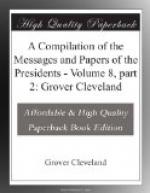majority had the right to grant, but which they did
not think proper to intrust to their agents, and that
which they could not have granted, not being possessed
by themselves. In other words, there are certain
rights possessed by each individual American citizen
which in his compact with the others he has never
surrendered. Some of them, indeed, he is unable
to surrender, being, in the language of our system,
unalienable. The boasted privilege of a Roman
citizen was to him a shield only against a petty provincial
ruler, whilst the proud democrat of Athens would console
himself under a sentence of death for a supposed violation
of the national faith—which no one understood
and which at times was the subject of the mockery of
all—or the banishment from his home, his
family, and his country with or without an alleged
cause, that it was the act not of a single tyrant
or hated aristocracy, but of his assembled countrymen.
Far different is the power of our sovereignty.
It can interfere with no one’s faith, prescribe
forms of worship for no one’s observance, inflict
no punishment but after well-ascertained guilt, the
result of investigation under rules prescribed by
the Constitution itself. These precious privileges,
and those scarcely less important of giving expression
to his thoughts and opinions, either by writing or
speaking, unrestrained but by the liability for injury
to others, and that of a full participation in all
the advantages which flow from the Government, the
acknowledged property of all, the American citizen
derives from no charter granted by his fellow-man.
He claims them because he is himself a man, fashioned
by the same Almighty hand as the rest of his species
and entitled to a full share of the blessings with
which He has endowed them. Notwithstanding the
limited sovereignty possessed by the people of the
United States and the restricted grant of power to
the Government which they have adopted, enough has
been given to accomplish all the objects for which
it was created. It has been found powerful in
war, and hitherto justice has been administered, an
intimate union effected, domestic tranquillity preserved,
and personal liberty secured to the citizen.
As was to be expected, however, from the defect of
language and the necessarily sententious manner in
which the Constitution is written, disputes have arisen
as to the amount of power which it has actually granted
or was intended to grant.
This is more particularly the case in relation to that part of the instrument which treats of the legislative branch, and not only as regards the exercise of powers claimed under a general clause giving that body the authority to pass all laws necessary to carry into effect the specified powers, but in relation to the latter also. It is, however, consolatory to reflect that most of the instances of alleged departure from the letter or spirit of the Constitution have ultimately received the sanction of a majority of the




